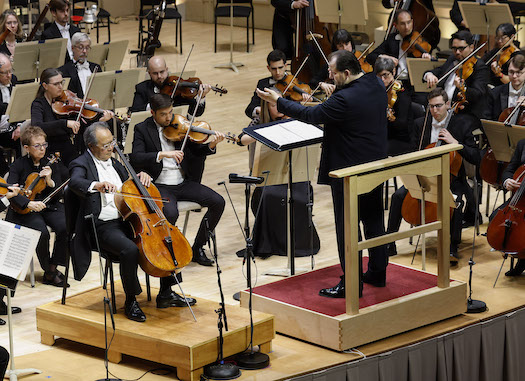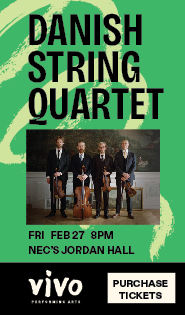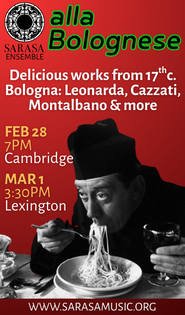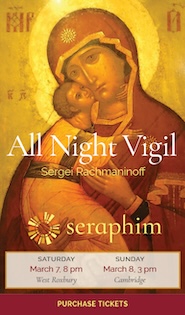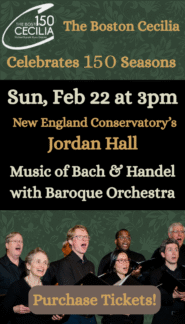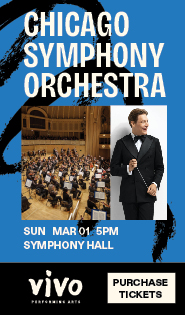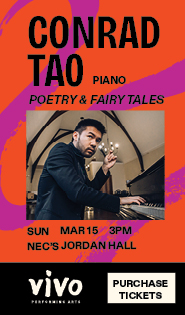Yo-Yo Ma, BSO plumb emotional depth, timely resonance with Shostakovich
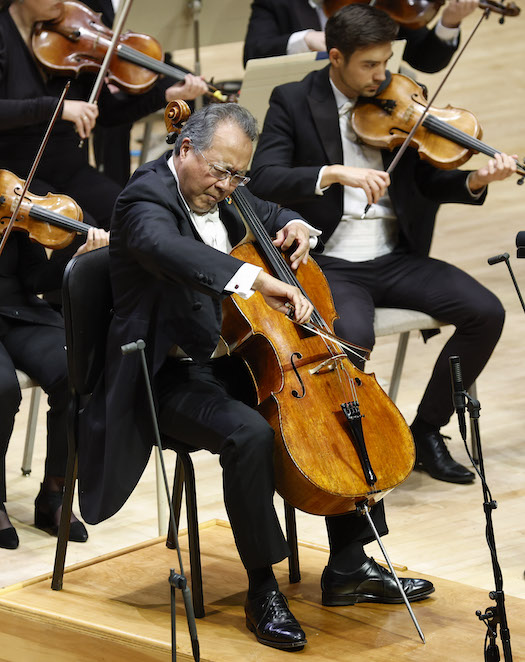
Yo-Yo Ma performed both Shostakovich cello concertos with Andris Nelsons and the
Boston Symphony Orchestra Thursday night at Symphony Hall. Photo: Winslow Townson
To judge from his appearance with the Boston Symphony Orchestra and Andris Nelsons on Thursday night, Yo-Yo Ma isn’t just the world’s most famous cellist. He’s also a collegial mensch.
No sooner had the rousing ovation following his performance of Dmitri Shostakovich’s Cello Concerto No. 1 commenced than Ma emerged from backstage with three colleagues in tow, plopped himself down at the last stand in the ensemble’s cello section, and shushed the near-capacity crowd in Symphony Hall. Then he proceeded to anchor his associates as the front desks led a soaring encore of Gautier Capuçon’s all-cello arrangement of the “Prelude” from Shostakovich’s Five Pieces for two violins and piano.
The gesture was as unexpected as it was fitting, given both Ma’s long relationship with the BSO and the strong rapport on display between soloist and orchestra across the night.
To be sure, that closing moment had the peculiar effect of focusing the mind back on the heavy-duty program of music by Shostakovich, Franz Joseph Haydn, and Iman Habibi just completed. While just one of the pieces qualified as familiar, all were intensely played and nearly everything felt uncannily timely.
The latter situation has emerged with uncomfortable frequency these last eight years as Nelsons and the BSO recorded their way through the complete Shostakovich symphonies. Now that they have moved on to the concertos little has changed: Thursday’s accounts of both of the composer’s concertante works for cello (which were taped for future release by Deutsche Grammophon) resonated eerily with last weekend’s terrorist attacks in Israel.
Both Nelsons and Ma emphasized that connection in comments to Thursday’s audience, the latter circumspectly, the former directly. At the conclusion of the conductor’s painfully halting commentary, the house held a moment of silence for victims of the atrocities. (One wishes the BSO’s music director would speak from notes on such occasions, rather than extemporaneously, even if the sincerity of his feelings last night was plainly evident.)
In any event, words were hardly necessary: Shostakovich’s two cello concertos say everything that needs to be said right now—and then some.
The First is by far the more popular and compact of the two. Written in 1959, it is, by turns, playful, sober, ironic, and defiant, with a single horn serving as a kind of foil to the solo cellist’s machinations.
Coming just seven years later, the Second inhabits an entirely different world. In it, shadows abound. The big first movement is a searing elegy, grim and fatalistic. The second parodies an Odessa street vendor’s song; the ditty is worked out thoroughly in the finale. After that movement’s screaming apogee, the solo line unwinds to the accompaniment of ticking percussion.
Whether the latter is the sound of clocks or a time bomb is unclear. Either way, the ending is harrowing: the soloist simply stops playing, mid-phrase, like a candle randomly snuffed out. Last night, Ma delivered that moment with theatrical aplomb, freezing in place, and Nelsons held the silence for a good forty seconds before anybody in the hall dared to move.
The broader performance was similarly gripping. Ma imbued the lyrical passagework in his part with a dusky, rich tone and becoming soulfulness. But he didn’t stint on droll character (in the scherzo) or shapely intensity (in the finale).
Nelsons drew a well-balanced, beautifully blended accompaniment from the BSO. Particularly notable were the luminous solos in the closing Allegretto from principal flute Elizabeth Rowe and principal clarinet William R. Hudgins.
In the First Cello Concerto (which, on Thursday, was presented second), Ma and the orchestra were likewise smartly matched in articulation and spirit. The Allegretto was dry, tight, and jaunty. So was the finale, whose earthy rhythms spun out into a wild, stomping dance.
But it was the central Moderato, with its comforting solo line, gorgeous orchestral string sonorities, and fervent development that carried the night. Indeed, Ma’s flawlessly projected harmonics and the BSO’s magically concentrated textures at its close were the picture of a musical ideal rarely realized.
In between the Shostakovich selections came Habibi’s Zhiân. If, as Ma put it, Shostakovich’s music embodies “the ultimate vision of speaking truth to power,” the Tehran-born, Toronto-based composer seems to be attempting the same thing here, though a bit less forcefully.
Premiered this summer at Tanglewood, Zhiân takes as its departure point the protests that developed following the death of Mahsa Amini at the hands of “morality police” in Iran last September. The 13-minute-long score is built around a rhythmic motto chanted during the demonstrations and also involves a bit of thematic transformation in the spirit of Liszt and Strauss.
As such, it’s an agreeable effort, despite a tendency of slipping a bit too readily into Hollywood-worthy bombast and cliché (the final B-major chord feels cloyingly trite). Additionally, the work might benefit from a more comprehensive and striking development of its materials.
That said, Zhiân is kaleidoscopically scored and clearly structured. Its melodic denouement is thoroughly satisfying, and the piece boasts several striking moments, not the least of which is a breathtaking sequence in which a solo oboe sings beneath a canopy of gossamer string harmonics and quietly noodling woodwinds. Afterwards, the composer was on hand to bask in the audience’s warm applause.
To open the night, Nelsons and the BSO delivered a weighty, sometimes literal account of Haydn’s early Symphony No. 22 (“The Philosopher”). Though occasionally lacking in nuance and rhythmic bite, the reading exhibited strong dynamic contrasts and, in the opening Adagio, winningly plangent colors.
The program will be repeated 1:30 p.m. Friday, 8 p.m. Saturday, and 2 p.m. Sunday at Symphony Hall. bso.org
Posted in Performances
